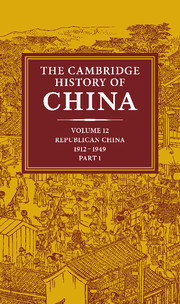Book contents
- Frontmatter
- 1 Introduction: Maritime and continental in China's history
- 2 Economic trends, 1912–49
- 3 The foreign presence in China
- 4 Politics in the aftermath of revolution: the era of Yuan Shih-k'ai, 1912–16
- 5 A constitutional republic: the Peking government, 1916–28
- 6 The warlord era: politics and militarism under the Peking government, 1916–28
- 7 Intellectual change: from the Reform movement to the May Fourth movement, 1895–1920
- 8 Themes in intellectual history: May Fourth and after
- 9 Literary trends I: the quest for modernity, 1895–1927
- 10 The Chinese Communist Movement to 1927
- 11 The Nationalist Revolution: from Canton to Nanking, 1923–28
- 12 The Chinese bourgeoisie, 1911–37
- Bibliographical essay
- Bibliography
- Index
- Republican China – physical features
- References
7 - Intellectual change: from the Reform movement to the May Fourth movement, 1895–1920
Published online by Cambridge University Press: 28 March 2008
- Frontmatter
- 1 Introduction: Maritime and continental in China's history
- 2 Economic trends, 1912–49
- 3 The foreign presence in China
- 4 Politics in the aftermath of revolution: the era of Yuan Shih-k'ai, 1912–16
- 5 A constitutional republic: the Peking government, 1916–28
- 6 The warlord era: politics and militarism under the Peking government, 1916–28
- 7 Intellectual change: from the Reform movement to the May Fourth movement, 1895–1920
- 8 Themes in intellectual history: May Fourth and after
- 9 Literary trends I: the quest for modernity, 1895–1927
- 10 The Chinese Communist Movement to 1927
- 11 The Nationalist Revolution: from Canton to Nanking, 1923–28
- 12 The Chinese bourgeoisie, 1911–37
- Bibliographical essay
- Bibliography
- Index
- Republican China – physical features
- References
Summary
EVOLUTIONISM IN REFORM THOUGHT
The years 1898 and 1919 are usually thought of as two watersheds in the history of China's intellectual break with the values of Confucian civilization. The 1898 reform movement was an effort at institutional change on the part of ranking literati close to the throne. It began as a response to military defeat by Japan in 1895, but ended in the abandonment of the traditional Sinocentric world-view and a large-scale effort to assimilate the ‘new learning’ (hsin-hsueh) of the West. The movement bore fruit in the late Ch'ing modernization drive and in the collapse of the imperial system in 1911, bringing in its wake a wave of still more sweeping intellectual re-evaluation. Where the cutting edge of reform in 1898 had been directed at the inherited political order, the intellectual campaign for a totally ‘new culture’, which was symbolized by the May Fourth demonstrations of 1919, was seen as an attack upon the traditional moral and social orders as well. The leadership of the later movement came from China's newly modernized universities and schools. In addition to anti-imperialism, its goal was the establishment of a scientific and democratic ‘new culture’ purged of all relics of China's feudal past. In a generation China's intellectuals had apparently moved from the questioning of core traditional values to their total repudiation.
Moreover, in this same generation the intellectual elite as a class had undergone a number of important structural changes. It had created novel modes of communication and association, in the form of newspapers and periodical press on the one hand, and various types of study societies and political parties on the other.
Keywords
Information
- Type
- Chapter
- Information
- The Cambridge History of China , pp. 322 - 405Publisher: Cambridge University PressPrint publication year: 1983
References
Accessibility standard: Unknown
Why this information is here
This section outlines the accessibility features of this content - including support for screen readers, full keyboard navigation and high-contrast display options. This may not be relevant for you.Accessibility Information
- 13
- Cited by
